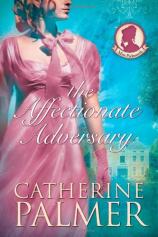The Affectionate Adversary
Review
The Affectionate Adversary
Catherine Palmer is a bestselling, award-winning romance novelist, and her latest, THE AFFECTIONATE ADVERSARY, turns her talents towards love in the early 1800s between a commoner and a wealthy baroness.
Charles Locke is a good man with high aspirations of spending the family's savings by investing in tea, which he believes holds the key to their future success. While at sea, a pirate attack scuttles his plans, and he is left for dead. Another ship arrives in time to rescue him, and the widowed Sarah Carlyle nurses him back to health. Locke falls in love with her, not realizing that Sarah is a titled heiress. However, Sarah has other future plans in mind, namely getting rid of a fortune that weighs her down with guilt by distributing it to various deserving charities.
When the two are back in England, Charles discovers her wealthy status and sets out to convince her that his feelings for her are real and that he's not another gold digger. (Although, he does confess to himself, "Though he did love Sarah, as much as before, the knowledge of her fortune had affected him.") He is not in her social class and seemingly she is out of his reach. However, as they reconnect through mutual friends, Sarah's gentle influence on Charles begins changing his priorities. Soon, he begins to see money not just as a way to pleasure and leisure, but as something that could be put to work to make a difference in the world.
Which is a moot point, since he's lost all the family fortune to pirates…or so it seems. Meanwhile, Sarah's piety is called into question by Charles, who helps her come to grips with a difficult past and to see that what she wants to do with her money and what God may want might be two different things. An advice columnist is consulted by Sarah's family about her potential relationship, and the answer may nudge Sarah into making a decision. (This is the first book presumably of a series introducing advice columnist Miss Pickworth, according to the jacket.)
Like everything Palmer does, the story reads well. The trouble is with certain plot developments and characterizations. The difficulty for the reader will be in suspending disbelief about a few points. Sarah's first marriage, it seems, was never consummated; an unnecessary stock plot development in many Christian novels. (It seems as if faith romance likes its protagonists to be virgins!) The relationship among the three sisters is never fleshed out well, and there's more telling than showing in their relationship. Sarah's resistance to Charles is never quite believable, except that it keeps the story moving along. I never "bought" Sarah's attitude toward money. John Grisham pulled off this sort of "woman who doesn't want her fortune" character in THE TESTAMENT with aplomb. But Palmer fails to bring it off convincingly here.
There's a definite author aspiration toward reminding readers of Jane Austen, with references to the game of whist, locations such as Brighton and Cheapside, and lines such as "It pains me to disappoint a deeply respected father…" or Pru's skirts "six inches deep in dirt." (Can you say Pride and Prejudice?)
However, nice specific details help readers immerse themselves in the time period of the early 1800s, and there is enough of a spiritual development plotline to hook readers who like their romance to evince something more than love and passion. If you enjoy the tea angle, which is not much more than a minor part of the story, you might also investigate LEAVES OF HOPE, Palmer's upcoming contemporary romance novel with tea as central to the plot.
Reviewed by Cindy Crosby on February 17, 2006











